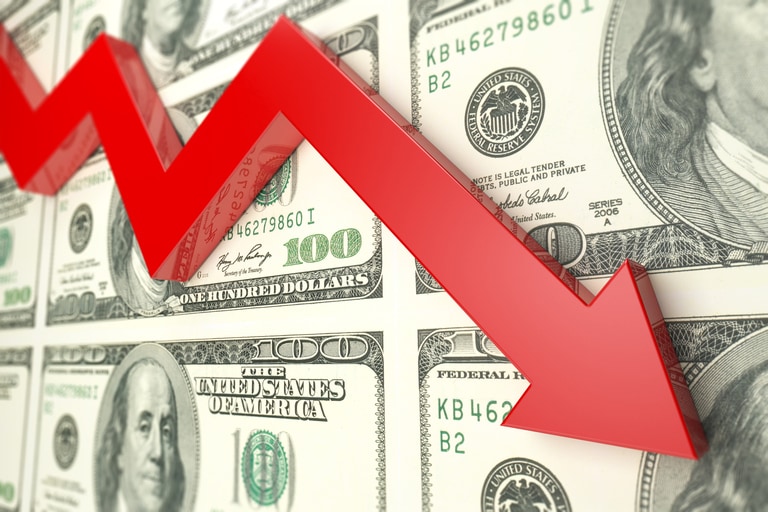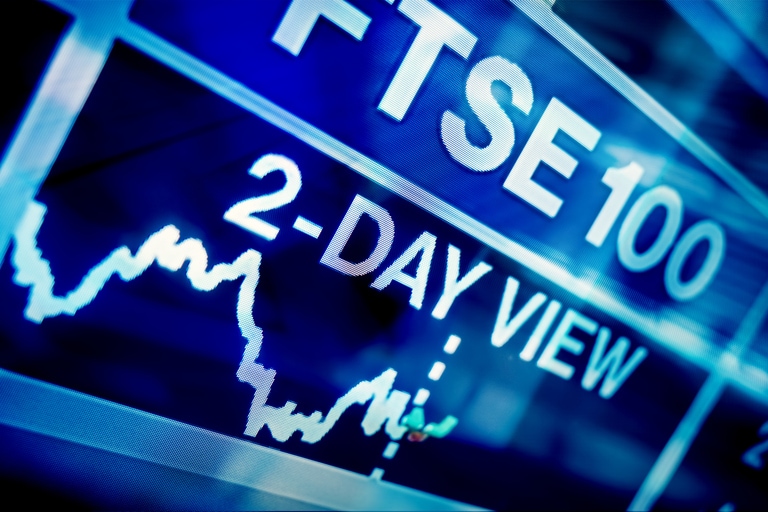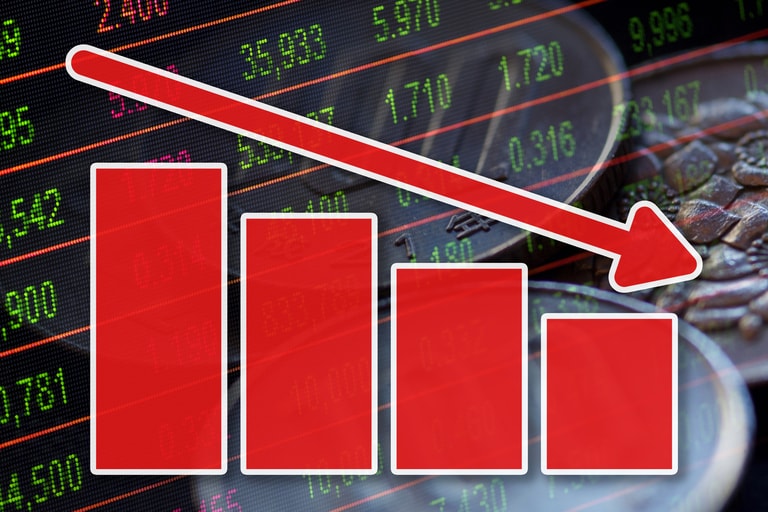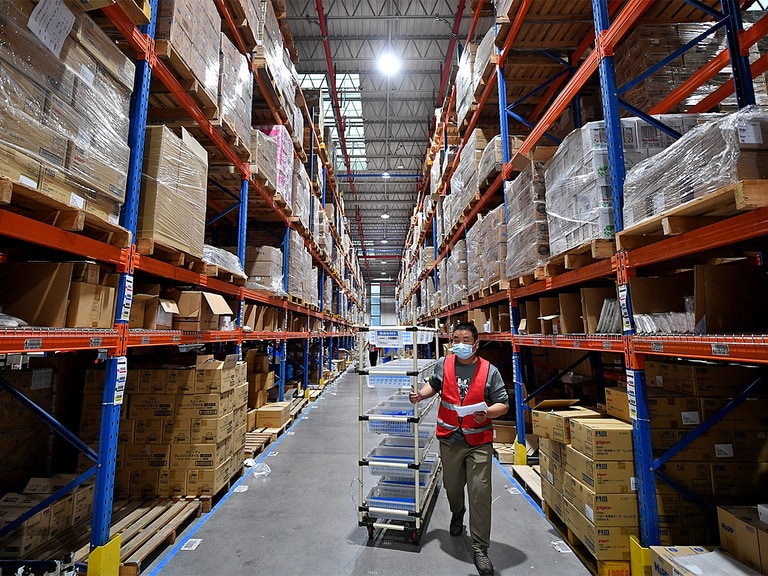It’s been another disappointing session for European markets today, sliding back after another strong inflation report, this time from the UK, as investors worry about the effect a continued acceleration in prices might have on consumer incomes, and ergo company profit margins.
Europe
After their big rebound yesterday crude oil prices have continued to push higher, reinforcing these concerns, ahead of tomorrow’s With the European Central Bank rate meeting where the ECB appears to be caught like a rabbit in headlights as inflationary pressures push them ever closer to a rate rise by year end.
The FTSE100 is outperforming, helped largely by resilience in basic resources and energy.
Also on the positive side, British Airways owner IAG shares are doing well after optimistic outlooks from its US peers Delta Airlines and American Airlines. Delta said it had seen record bookings amidst optimism that it would be profitable in each remaining quarter of the current financial year.
It’s been a disappointing day for retail shares today after UK inflation hit its highest levels since the early 1990’s, at 7% on the CPI measure, and 9% on RPI.
This set the tone for the rest of the day, with Tesco shares slipping back despite beating expectations for its full year numbers, posting a 2.4% rise in annual group sales, which helped boost full year adjusted operating profits of £2.83bn, a rise of 58.9%.
Free cash flow surged by almost 70% to £2.28bn while the company boosted its buyback program to £750m and said it would pay a final dividend of 7.7p a share.
All so far so good, however management painted a cautious outlook for the upcoming fiscal year saying they expected adjusted profits to be lower, due to a combination of higher operating costs, as well as slimmer margins as it looks to maintain its position as the UK’s number 1 food retailer.
For 2023 adjusted operating profits are expected to come in between £2.4bn to £2.6bn, a modest decline on today’s numbers.
The decline in Tesco shares has had a sector wide effect with Sainsbury and Ocado shares also lower, along with Marks and Spencer. We’re also seeing weakness in the likes of B&M European Retail, JD Sports and Associated British Foods.
Today’s bigger than expected rise in headline inflation has also impacted on house builders, over concerns that the Bank of England will have to raise rates faster than expected, potentially pushing up the cost of mortgages, with Persimmon, Taylor Wimpey and Berkeley Group all under pressure.
GlaxoSmithKline is in the news after it announced it had paid $1.9bn for Sierra Oncology is a company that focusses on therapies for the treatment of rare forms of cancer, with a particular focus on blood.
Ted Baker shares are higher after the clothing retailer confirmed that recent bidder Sycamore Partners will be taking part in the talks around a formal sale of the business.
US
US markets opened lower after the latest US PPI numbers showed inflation in the US economy appears to be nowhere near close to peaking, although judging by the reaction in the bond market you wouldn’t know it, as yields fell back.
After US CPI hit its highest levels since 1981 at 8.5% in March, in figures released yesterday, there was some straw clutching going on that perhaps we might be nearing a peak in inflationary pressures in the US economy.
For this to happen we would really need to see some evidence that PPI is starting to slow, and thus far there has been little evidence of that if the recent prices paid numbers for the latest ISM surveys are an accurate benchmark.
Today’s US PPI numbers for March have done little for the argument that inflationary pressures are easing, coming in well above expectation at 11.2%, while core prices rose to 9.2% from 8.7%.
That said, yields have fallen back across the board, either because markets are now starting to worry about recession, or we’re getting a little bit of position adjustment ahead of the long Easter weekend.
JPMorgan Chase shares have slipped back as we kick off Q1 US bank earnings season, posting adjusted revenue of $31.59bn, and profits of $8.3bn or $2.63c a share, falling slightly shy of expectations on the profits front.
The weakness appears to have been driven by its investment banking division which saw revenues come in short at just over $2bn, with fees revenue sharply lower. Equities trading, and fixed income managed to beat expectations to the tune of $3.06bn and $5.7bn.
On the retail side, CEO Jamie Dimon said the bank was largely seeing positive trends, with deposits up 9%, credit and debit card spending up by 21%, while card loan balances were up by 11%, although still below pre-pandemic levels. The jump in consumer spending neatly ties into the big jump we saw in the most recent US consumer credit numbers we saw for February of $41bn. Home lending unsurprisingly was down 37% mainly due to the higher interest rate environment.
Another concern was the bank setting aside $1.5bn in various loan loss provisions due to rising inflation risks, as well as a result of its Russian exposure, which it said could cost it as much as $1bn a few weeks ago.
The bank also said it was looking to buy back $30bn of its shares.
Delta Airlines shares have moved higher despite announcing a Q1 loss of $1.23c a share, however record sales bookings have prompted optimism that despite higher fuel prices, the post pandemic recovery story remains intact. Q1 revenue was $8.16bn, modestly beating expectations with the airline saying it expects to be profitable in each of the remaining quarters this year.
We’ve also seen American Airlines lift its Q1 outlook ahead of the release of its Q1 numbers next week.
FX
It’s been an interesting day for currency markets with the New Zealand dollar amongst the worst performers despite the RBNZ hiking rates by a bigger than expected 50bps over concerns that inflation expectations are running out of control.
The decline in the Kiwi appears to be premised on the belief that New Zealand is front loading its rate hikes for this year, without changing the extent to which it is prepared to raise rates by year end.
The Bank of Canada proceeded to follow suit, also raising rates by 50bps to 1%, while also announcing that they would stop the purchase of government bonds from April 25th.
The Japanese yen has continued to come under pressure, hitting its lowest levels in 20 years against the US dollar above 126.00, as rate expectations between the US Federal Reserve and the Bank of Japan continue to widen.
The pound has held up fairly well, although it has continued to make much in the way of progress, despite a bigger than expected jump in headline CPI for March to 7%. There appears to be a significant degree of doubt as to the Bank of England’s commitment in meeting its inflation mandate of 2%, after deputy governor Jon Cunliffe voted to keep rates on hold at the last meeting. Whether today’s super-hot inflation number prompts a change of heart remains to be seen, but one thing is certain the odds of a 50bps hike in May appear to have gone up considerably, especially when you consider the April numbers are likely to see a number nearer to 8%, and 10% RPI.
Commodities
Gold prices have continued to look resilient after Russian President Vladimir Putin confirmed the worst kept secret in Europe that peace talks with Ukraine were at a dead-end. With inflation showing little sign of slowing and support from central banks for economies being pared back, the safe-haven allure of the yellow metal has been rising as we look for a retest of the $2,000 level, and the March highs.
Having rebounded strongly yesterday, oil prices are showing little sign of softening after Russian President Vladimir Putin said that peace talks with Ukraine were a “dead-end situation”. This shouldn’t be too much of a surprise, given how few people had thought Russia was serious about reaching a ceasefire, and at least draws a line under what has largely been a charade.
It’s more surprising that it has taken so long for Russia to admit it, given that the talks were mainly a PR exercise which no-one believed anyway. On the other hand, further gains in prices could be constrained after the IEA downgraded its global demand forecasts for this year due to the imposition of extended new lockdowns in China. This appears to be borne out by a surprise 9.38m barrels build in US EIA inventories last week, against an expectation of a 1m build.
Volatility
European banks have been thrust into the spotlight in terms of price action. Following Soc Gen’s boost on news that it is pulling out of Russia, volatility for the company’s stock remains elevated, printing 184% on the day and over 90% on the month. Keeping with the sector, Deutsche Bank and Commerzbank have also been in focus following a significant stake sale going into the close on Monday. There’s uncertainty as to who is behind the move, but with concern over Germany’s economic reliance on Russian fuel imports, worst case scenarios are potentially bleak. DB’s daily vol spiked to 168% against 85% on the month, whilst Commerzbank rose to 166% over 88%.
No surprise off that backdrop that CMC’s proprietary European Banks basket of shares also found elevated levels of interest, printing daily vol of 82% against 58% on the month.
Fears over the outlook for the German economy have also been hitting the country’s growth indices with both the tech and mid-cap references gapping lower at the open before staging something of a recovery. Daily vol on the German Tech 30 hit 44% against 32% on the month, whilst on the German Mid 50, prints of 39% and 30% were recorded.
As for commodities, Lumber continues to dominate in terms of price action, but the US Natural Gas contract has also been in focus, with shares bouncing around in a range of more than 5% during the session. Daily vol reached 67% against a monthly print of 56%.
CMC Markets erbjuder sin tjänst som ”execution only”. Detta material (antingen uttryckt eller inte) är endast för allmän information och tar inte hänsyn till dina personliga omständigheter eller mål. Ingenting i detta material är (eller bör anses vara) finansiella, investeringar eller andra råd som beroende bör läggas på. Inget yttrande i materialet utgör en rekommendation från CMC Markets eller författaren om en viss investering, säkerhet, transaktion eller investeringsstrategi. Detta innehåll har inte skapats i enlighet med de regler som finns för oberoende investeringsrådgivning. Även om vi inte uttryckligen hindras från att handla innan vi har tillhandhållit detta innehåll försöker vi inte dra nytta av det innan det sprids.






